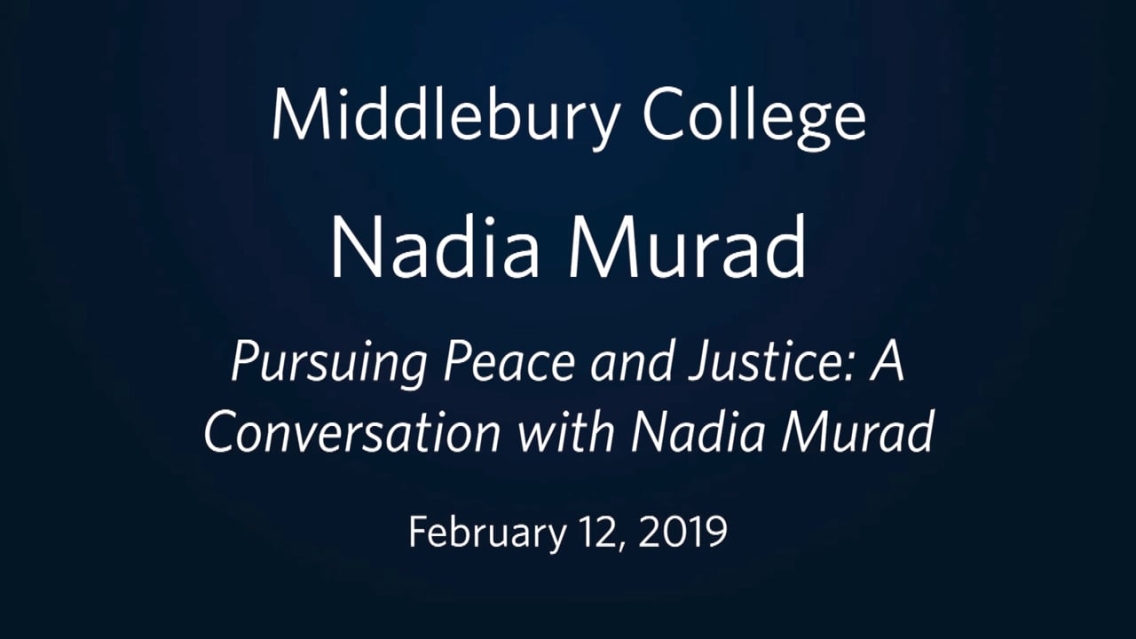Nobel Laureate Nadia Murad Speaks at Wilson Hall
Murad was 19 when ISIS fighters swarmed her homeland in the Sinjar District of northern Iraq in 2014. She’d grown up, and spent her life, in the village of Kocho, a community of 1,700 Yazidis. “We had a simple but a very good life,” said Murad. She lived at home with eight brothers and two sisters; a few of her brothers worked as mechanics, but the family earned their living primarily by tending cattle and a flock of 170 sheep.
The Yazidis are a small religious minority indigenous to northern Iraq, northern Syria, and southeastern Turkey; the ancient monotheistic religion is estimated to have some 500,000 to 700,000 members worldwide. “[Yazidis] were not known to many people,” said Murad, speaking through her interpreter. Western visitors to Baghdad or Kurdistan likely knew little of the insular community, and Yazidis often lived in poor, neglected areas without political clout. And yet, Murad said, “Yazidis lived peacefully with their neighbors for many, many years.”
The Yazidis catapulted into international news in 2014 as ISIS advanced on Sinjar. ISIS was intent on eradicating the Yazidis, executing men and enslaving women and children. Islamic State fighters rounded up the Yazidi community in Kocho, killing 600—including six of Murad’s brothers and stepbrothers. Murad became one of more than 6,700 Yazidi women and children taken prisoner by the Islamic State. Enslaved in Mosul for roughly a month, Murad was beaten, raped, and burned with cigarettes. She escaped after her captor left the house unlocked, and a neighboring family helped smuggle her out of the region. She fled to a refugee camp in northern Iraq.
“I think we all recognize how incredibly brave you’ve been to repeatedly talk about what happened to you in 2014 under [ISIS] captivity,” said Armanios. “Could you tell us about how you were able to really gather the strength to turn this experience of trauma and difficulty into what’s really become a life of full activism on your part?”
“Sometimes it’s our destiny to do things that we did not wish to do,” said Murad. “For me, for my family, for my community, what happened to us was something unimaginable and unfortunate, and through these terrible things, the world got to know me and my community. We did not want to be known to the world through this genocide.”
Murad acknowledged the taboos that she faced in speaking up, and said her family was initially hesitant at the prospect of her testifying about her experiences in captivity. She was undeterred. “I had no other choice but to do it,” said Murad, whose motivation for speaking out was rooted in the desire to help her community.
Murad now leads Nadia’s Initiative, a nonprofit dedicated to rebuilding communities in crisis and advocating for victims of sexual violence. She’s committed to rebuilding and demining Sinjar, the Yazidi ancestral homeland, and pressing nation states to formally recognize the Yazidi genocide. She’s also spoken at length about her experience under ISIS, breaking entrenched social taboos that have long curtailed women in the Middle East from speaking about sexual violence.
Today, an estimated 3,000 women and children remain in ISIS captivity, said Murad, and some 350,000 Yazidis still live in refugee camps, unable to return to the dangerous and unstable region of Iraq that has been their home for centuries. Those who have returned to Sinjar live without electricity, health care, and other crucial services. Some international governments have supported the Yazidis, Murad said, pointing to Canada, France, and Australia as examples. But many families still find themselves without a safe place to call home. Some Yazidi families make it to Europe, only to have their homes raided by police, or find themselves denied asylum.
“This August will be the fifth anniversary of the Yazidi genocide,” said Murad. And yet, to date, the Iraqi and Kurdish governments have failed to form a task force or military operation to search for those women and children who were taken captive. Today, she said, “there are thousands of Yazidi survivors, mostly in the camps, who are not receiving help from their own government.”
“If we do not get justice for this, it means the end of this community,” said Murad.
Turning to address the solemn crowd of students, Murad reminded the audience to be grateful for the luck and opportunity that comes with being a student and choosing one’s own path—a luxury that not every young person enjoys. Murad spent 11 years in school in Kocho, only to find her life upended in the space of an hour.
“I was able to fight ISIS through a simple and small message that I have been delivering,” she told the students. “Not every fight is a government fight or a military fight. I count on people like you.”
Nadia Murad’s talk at Middlebury College was supported by the John Hamilton Fulton Memorial Lectureship fund.
By Kathryn Flagg ’08; Photos by Todd Balfour


